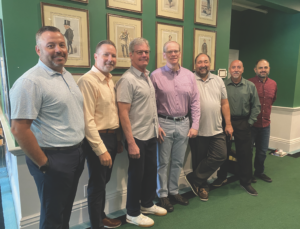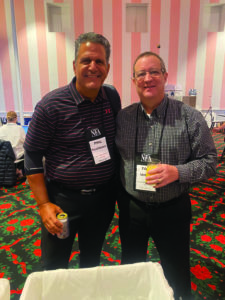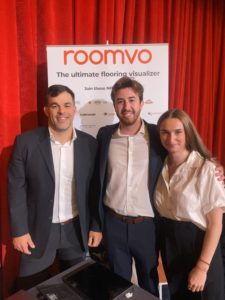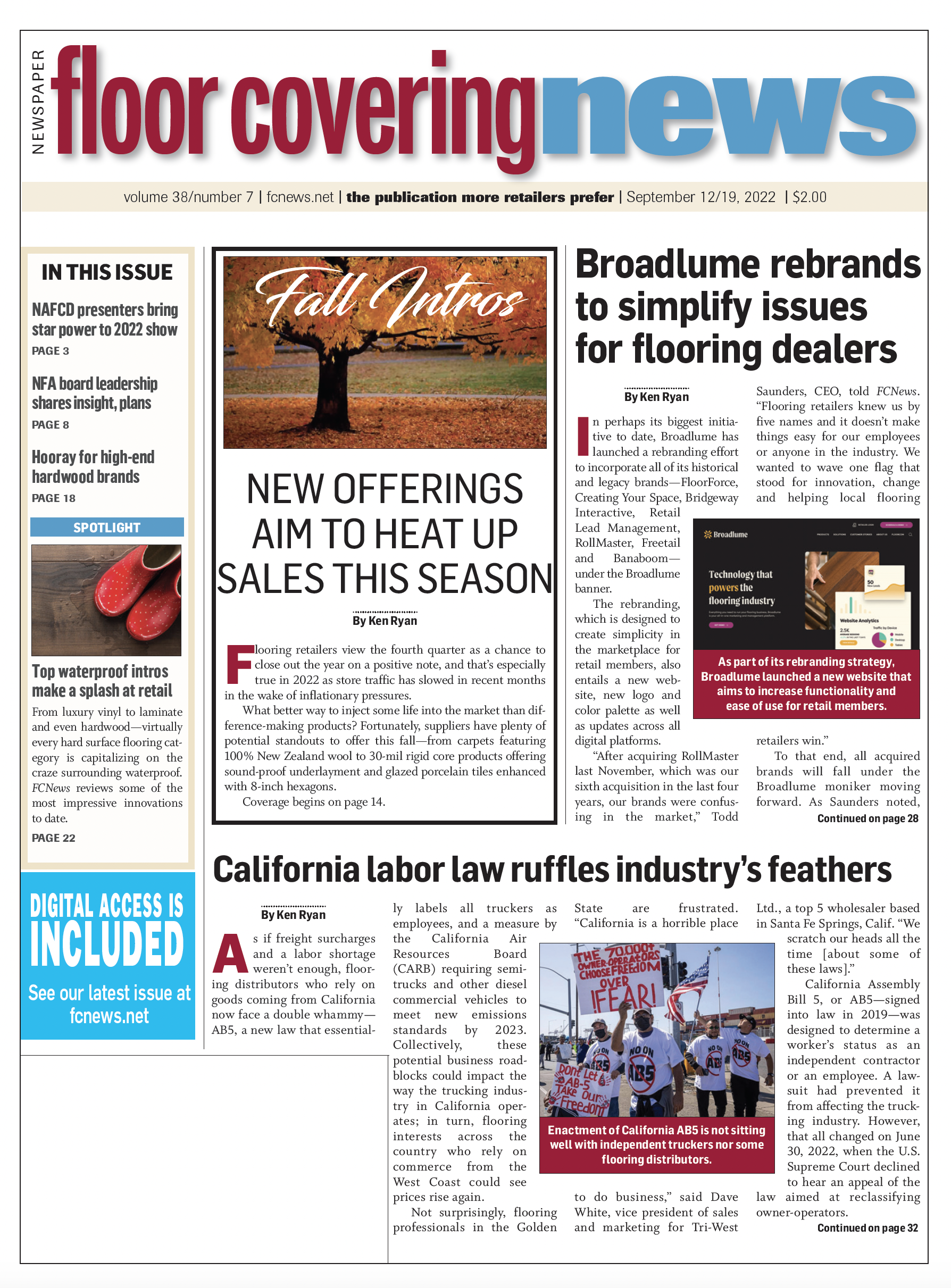
Mackinac Island, Mich.—The National Floorcovering Alliance (NFA) held its fall meeting here at the Grand Hotel where the group elected new officers that start their terms at the beginning of 2023. Ian Newton of Flooring 101 was named incoming president; David Chambers of Nebraska Furniture Mart, incoming vice president; Jessica Arscott of Floortrends in Canada, incoming secretary; and Jason Waggoner of ICC Floors, incoming treasurer.
During the NFA fall meeting, FCNews co-publisher, Steven Feldman, sat down with several key executives of the NFA to cover a range of topics—from the group’s goals and objectives to current business conditions to suppliers helping NFA members succeed.
Joining Feldman were: Newton; Chambers; Jason McSwain, outgoing president; Dan Mandel (Sterling Carpet & Flooring), board member; and Eric Mondragon (RC Willey Home Furnishings), outgoing treasurer.
Ian and David, give me some of your goals and objectives for the next two years.
Newton: Obviously there’s a lot of talk about domestic production. So I think as a group, I think we’d definitely like to get in on the ground floor of that. There’s a lot of opportunity. Some suppliers are going to make SPC domestically that’s going to be exclusive to NFA. And I think we can build on that.
Chambers: Continued focus on providing solutions to the membership, particularly around warehousing and logistics. Everybody seems to be bursting at the seams right now and trying to just stay afloat from the warehousing side. Sales are great, but we’re all struggling on the warehouse piece of it. Secondly, solutions around connecting all the software that is out there for flooring to help move each person’s business forward. How do you get them all to work together?
Any particular changes you would like to see occur within the group over the next couple of years?
Newton: We have more members involved than ever before. It’s exciting how many people actually stepped up and volunteered to either be on the board or be on groups. There are a lot of young second- and third-generation members who participate. So there’s a lot of energy around that.
If you could wave your magic wand and make a change to the bylaws, what would they be?
Chambers: I can’t think of a change to the bylaws, per se, that we need. What I’m noticing with these second- and third-generation people getting more involved, we’re losing some of the tribal knowledge about what the bylaws say. So probably as a group, we need to do a better job continuing to educate the membership about the bylaws and what they mean so everybody has a really good understanding about how we need to perform.
Mondragon: I don’t think anything needs to be changed, but if there was anything we could add to the bylaws that would be a succession plan because we do have older members and some of them do not have that in place right now. I’m not sure that’s something you put in the bylaws, but I think it’s something you consistently have to bring up just to make sure there is some succession planning.
One of the things I hear from certain members is they’re not particularly fond of the “one vote and you’re not in.” Is there any chatter to do away with that particular bylaw?
McSwain: We brought good closure to that in the spring. It was fully talked about, vetted, voted. And at that point there wasn’t a change that the group wanted to make to move forward.
Mondragon: It was discussed in two different meetings. And finally it came to vote and the majority of members said they still want the one vote.

Tell me about the NFA fall meeting yesterday. Highlights. Did you learn anything?
Mandel: We had a big focus on technology. A couple of members did some of their best practices based on technology they use in their business, and trying to take away from some of those things to bring to our own businesses. I think as an industry we’re probably a little behind the times when it comes to technology, and looking at some of these people presented yesterday, it was incredible to see how automated and ahead of the times they are.
The one thing I got out of the NFA fall meeting was probably the technology part of it. Just how much work we, as a business, have to do. It’s being more efficient in the warehouse, maybe bar-coding all of our inventory, which we never even thought about. It’s the front of the office, scheduling customer follow up. There are many things we can really do better, and technology makes it that much easier.
McSwain: The successes of last year—a record, banner year for us for retail individually—can’t be our undoing this year. We heard that from other members. “If our warehousing and accuracy and functions and processes isn’t as tight as they’ve always been, why is that?” And we got our eye off the ball for a while. We need to get tighter.
Did you learn any solutions for that?
McSwain: You hear bits and pieces and realize one member is doing great this year in sales and they would say it’s their lowest accuracy in their warehousing ever. You say, “I need to talk to that guy because we’re probably similar.” So I think there are a number of retailers where the supply chain disrupted all those pieces. Are you really where you want to be in the warehousing and the efficiencies? And if economic winds are changing, now’s not the time to not be at your best on the operational side.
Dave, what did you learn at the NFA fall meeting?
Chambers: Two things really stick out to me. The first one was Great Lakes’ presentation. I love innovative ideas and forward thinking. And they’ve rolled out a virtual home service where they can FaceTime with a customer to look at the service issue. And I thought it was an absolutely wonderful, innovative idea they implemented. And second was Piet [Dossche’s] presentation on what the industry is looking like in the next three years and what should we be looking for and how do we continue to position the NFA as the premier buying group.
What did Piet have to say?
Chambers: He had a really good presentation on domestic production that’s going to be coming. He honed us in that we are the strong buying group in the country and we can’t be afraid to be aggressive right now. Now is the time to push, open new stores, promote more, do what you can right now in this uncertain time—and you’ll take more market share. And he’s absolutely right. That’s one of the mantras that NFM has done for many, many years. When the economy goes to crap, we advertise more, we push more. And we want to come out of whatever the economy is. If it’s a recession, we want to come out of it stronger than we went into it with.
Did Piet make any projections over the next three years for the industry?
Newton: Just that domestic production could be 50% of the market by 2027.
With the way people are building, what did you learn yesterday?
Newton: One of the big pain points we have in our business and in the industry is claims, and streamlining that process is so important. One presentation yesterday focused on a program with Mobile Marketing on a way to streamline that process. So instead of taking three weeks, a month, three months to get a claim processed, we can do it within a matter of days. And that is tremendous advantage as far as customer service, because when that consumer’s looking at a defective product on her floor, not knowing when she’s going to have that replaced. And she’s sitting there not unpacking her stuff, not putting her furniture away. She’s in total limbo.

Eric, what’d you learn at the NFA fall meeting?
Mondragon: I wouldn’t say I learned anything. I think it reaffirmed what we already knew. It goes back to what Piet was saying: “Don’t be afraid.” He quoted a comment from Winston Churchill, who said: “Don’t let a good crisis go to waste.” That hit home to me that everybody in this group is always looking for opportunities to grab market share and better themselves. A lot of discussions yesterday were about everything from warehousing to inspections to filing claims—just being more efficient. Then to Raffi’s presentation about things Sarmazian Bros. created for their own business, because the industry doesn’t have anything that standardizes all those systems work together—the RFMS, the measuring systems, the billing systems, the inventory systems. So it was great to listen to everybody’s brainstorming about the things they’re doing to consistently make their businesses better.
One of the biggest takeaways that I got [from the NFA fall meeting] was something Michael Longwill from Airbase had done. We were talking about employee retention. He has his employees come in his warehouse, and there are three tiers of warehouse employees. So when they come in, they’re at that entry level, and this is what he pays them. Once they’ve progressed, they go to the next level and so forth, whereas most of us are in positions where it’s hard to find people, so you’re consistently raising wages just to attract them. We’re competing with the burger joints paying $20 an hour, and you’re trying to bring somebody in. But once you do that, what does that say to your employees who have been there for a while? It goes back to what I said: These are intelligent people who are consistently innovative and finding ways to be better.
Mandel: I agree. I’ve had a breakfast with someone and learned more in the 20 minutes talking to that person than sometimes I do in a whole meeting. I’ve made some decisions I’ve learned from other people that have added hundreds of thousands of dollars to my bottom line.
What are the biggest challenges NFA members face today?
Chambers: IT solutions. Software solutions, connecting them all, getting them all communicating. Staffing concerns still. How do you hire and keep warehouse people?
Is there an answer to that?
Chambers: It’s not exclusive to us and our industry. It’s a nationwide problem.
McSwain: Situated regionally, some places are worse than others.
How do we get out of this situation? How do we go back to the way it was?
Chambers: I don’t think you do. The world has changed and there is no going back. You have to adapt to what the new world is, and you have to find answers and move on.
Mondragon: You have to adjust. You adapt to the current environment. That’s all you can do. Sometimes things get automated. There are no more one-function jobs. People who are part of your staff, your program, become multi-taskers. They have to do various jobs in order to make things happen.
Let’s talk about business over the first eight months of the year. If you had to take a guess, what are NFA members up over 2021 as a whole?
Mandel: Just hearing from yesterday, from flat to 50%.
As a collective group, if you had to guess, how much is the NFA up for the year?
Newton: Single digits.
Chambers: I was going to say 7% to 12%.
What do you think the industry as a whole is up for the year?
Chambers: I would say sub 5%. I think as a membership we’re ahead of the curve.
Mondragon: I would agree with that. As I talk to the reps in our territories and ask for feedback on what they’re seeing in the marketplace, most of the competitors in my areas are struggling a lot more than we are.
McSwain: If you go back to the time when most people were putting their budgets and plans together for 2022 and thought, “Wow, this was the highest retail year ever. We’re going to grow another 10%.” And most retailers probably said, “I’ll be happy if I hit my budget.” And that’s down a little bit. And they’re at that or a little bit above that now.
Talking to retailers throughout the year in the industry, they say the first four months of the year were good. Then there was a little bit of a lull in May, June, July. And I heard August picked up again. Did you find the same thing in your businesses?
Chambers: Very similar.
Why do you think things picked up again in August?
Chambers: I think we’re seeing a shift back to our normal seasonality. I think there was that lull because everybody could vacation again.
Newton: A lot of people were traveling as you saw the airlines going crazy. And I think a lot of people spent money outside of fixing up their home for the first time in two years. But now you’ve got the kids back to school. They’re not traveling, so they can concentrate on home improvements again.
What are you forecasting for the rest of the year?
Newton: I think it’s going to be good. I don’t think we’re going to have a dip. I don’t think we’re seeing an increase in traffic coming into the store. We’re just seeing a real strong buying atmosphere where the people who come in are not so much tie kickers, they’re buying a lot larger tickets. So the jobs are bigger and the products are more expensive.
Mandel: I agree 100%. We’re not getting as many people coming in the store, but the people coming in are much more serious shoppers. And our tickets are higher, too.
Mondragon: Traffic is definitely off for us. But the conversion rate is a lot higher. And I said earlier that this fall selling season will tell us whether the fourth quarter is going to be strong. Those consumers are back home. They’re going to fix up their homes for the holidays and they could be as strong.
So inflation and rising interest rates really have not had as great an impact on this industry, in your estimation, as it has on other industries?
Mandel: I wouldn’t say that 100%. I still think inflation is a very real thing. I mean, at least just from a business owner standpoint, the cost of living is up, you have to worry about your employees, paying them more. But from a customer standpoint, it seems like people aren’t as open to just looking. The people who come in are ready to spend money.
Have you gotten pushback from consumers on higher prices? Because I don’t believe they know what flooring cost yesterday.
Mondragon: No, they don’t know.
Chambers: The normal consumer has no clue. They know there’s inflation going on, and they know things are more expensive, but they don’t know where the baseline was.
Mondragon: They know things are costing more. They just don’t know how much.
Newton: I think a lot of people have been buying because they know that prices are going up, and they want to buy it at today’s price.
The group has lost some members over the last year. Carpet King, Perques—to name two. Does that impact the group in any way with these departures?
McSwain: Absolutely. Each one has a DNA that feeds into the rest of the group. So in Perques’ case, that was a family business shift, and that was a sad day when we all learned. Stuart was a guy who gave ideas, he shared information, he was always willing to help. Carpet King was a rollup into private equity, and that’s an ownership change. Steve Brannan was one of the most engaged and likable members. So things change, but at the same time new members will come in.
Newton: Part of the fabric of the NFA is this idea sharing and how we all work together. So we’re in no hurry to replace a member once they move out. I think they have to be fully vetted, and there’s a lot of thought process that goes into that.
Are there any new potential members on the horizon?
McSwain: Yeah. The board has that as a responsibility. It’s taken different flavors over the years. Eric has been a part of some site visits, some interviews. But we want to make sure it’s a good balance of is the retailer right for the membership, and is it an opportunity for that retailer’s business to grow and move forward.
How does Armstrong’s situation impact you as individuals and the NFA as a whole?
Newton: As an individual, I don’t think there was a huge impact because their product line was not the greatest for a long time. I think the only thing we’re probably missing is the recognition of a brand that the consumer may have more awareness of, but that’s diminished over the years. I think more so on the commercial side is really what’s most important.
Does the Armstrong brand still resonate with the consumer today?
Chambers: A little bit. If you asked consumers, “Name three brands that you know are in the flooring industry,” I think a majority of consumers would probably still say Stainmaster. They would say Armstrong, and they may say Karastan. I think the real test is going to be what AHF is going to do with it. They have an opportunity and it’ll be interesting to see how it plays out. I don’t think many consumers have come into my showroom for many years saying, “I want to see your Armstrong flooring.” When they see it they may say, “I’ve heard of that brand.” And that’s about it.
Mondragon: In our markets, RC Willey is the brand. They see who we’re aligned with. They recognize the brands only because it comes through us. Technically, we are the brand. So if a brand disappears just like Stainmaster did and we moved on to something else… the beauty of today’s age is the mass distractions and how easily consumers can forget something. And they forgot the brand the minute we dropped it.
Newton: I think the one advantage we have as a group is we have had a very good relationship with AHF from the beginning. And that’s going to be a big advantage for us moving forward.
Eight months into the year, give me a few suppliers that have stepped up for the NFA in a big way and how.
Mandel: Shaw has always been a great partner to our group. They’re always very aggressive with all their programs, pricing and service, and they take a real vested interest in our success.
McSwain: AHF/Robbins has really invested time and are looking to bring competitive advantages to the membership, and the Robbins program is only going to get stronger.
Chambers: I’ll go off product and say Roomvo has brought a significant competitive advantage to the NFA in helping with visualization and other solutions. It is a solution for us to drive our business forward. They continue to help each member. They tailor a solution to the member on what they need most.
Newton: Stanton has seen tremendous growth with the group, and they are bringing a lot of new ideas to us. And they have a fantastic rug program that they’re launching this fall.
Mondragon: In terms of the vendors that are actively pursuing ways to make each one of us better, I would say Shaw, COREtec combined, No. 1. Cali, No. 2, as far as what I see them aggressively pursuing, not resting on their laurels and looking to grab more. Republic would be another one that I see aggressively pursuing and looking to try to grab market share within the group.
What does Cali and Republic do better than some of the other vendors?
Mondragon: Cali makes things very simple and makes it very difficult to say no. Whatever they offer seems to make sense to everybody. Republic is very aggressive, and they don’t give up.
Newton: And they have very good-looking product lines and the quality is good, too.
McSwain: I hear Cali is the most in tune with each member’s business needs. They keep numbers flowing to each other and they let you know, “Hey, you’re on, you’re off.”
Then we have The Dixie Group, which has brought new, lower-priced fashion products for that nylon showroom that was former Stainmaster Flooring Center. Fashion and function is still a key part of going to market. They’ve probably been the quickest to bring samples and making it workable for an RSA.
Newton: They delivered on the whole transition from a Stainmaster Flooring Center to the Premiere Flooring Gallery. They made that transition a lot easier, especially relabeling all the products.

